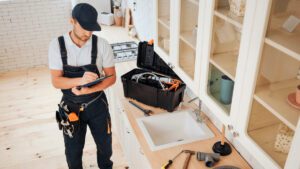Whether you are a professional property manager or you just own a rental property or two, there is a specific set of responsibilities that you should always be on top of to be able to sustain the business and make it a success. Rental property management is often perceived as a business with much profit, and many individuals expect to take over all the income easily and fast without using any cent on investing it back into the business. Most property managers are well aware that this is not how it works, and part of the profit must be invested back in the property, including not only taxes and insurance but also the rental property maintenance plan. That’s right, in many cases, people don’t want to spend money on maintenance and try to do it themselves or hire unprofessional crews for cheaper prices. This, however, has its own consequences, as what you put in is what you get out of it. And when it comes to rental property maintenance, you need three things—a reliable crew, an effective maintenance plan, and a carefully planned maintenance budget.
Why is rental maintenance important?
Good maintenance is one of the most crucial things for rental properties. Managing rental homes is not only about finding tenants and collecting the rent regularly, but it entails a list of success factors without which the business cannot be sustained. Having your rental properties maintained regularly will, first of all, ensure they are clean and presentable for sparking interest in the market. When it comes to rental properties, finding tenants is not the most important goal—it is finding the right tenants for the property that you should aim for to achieve real success. Poorly maintained homes will only attract tenants who will continue keeping them in bad shape, but a well-maintained one will attract the ones who are looking for cleanliness and are willing to provide that as well.
Finally, high-quality maintenance is a long-term investment you should be willing to make if you want to avoid additional expenses coming up as a result of ignoring the small issues and giving temporary and unprofessional solutions. There are a number of minor problems coming up over time in any house, and with rental properties, the rate is higher. Tenants are changing and so are their living habits and how they maintain the house over the course of living there. Thus, in order to avoid low vacancy rates and potential large-scale expenses, it is crucial to develop an effective maintenance plan and have professional rental property maintenance implemented routinely. The most important thing is choosing the right time to go for professional maintenance before it’s too late and there are major repairs necessary.
However, many individuals usually decide to cut all maintenance expenses and avoid going for professional rental property maintenance. It is often the uncertainty of maintenance costs required that intimidates them, which is why it is extremely important for anyone dealing with rental properties to know the basic ways to estimate rental maintenance costs themselves. In fact, there is more than one way of estimating this, and they are quite easy and accessible for everyone to do. Here are the simplest and most common ways you can estimate rental property maintenance costs yourself before considering maintenance outsourcing or hiring professional maintenance services.

How to estimate rental property maintenance costs
1. 1% Formula
The one percent formula is one of the easiest and most common ways to estimate rental maintenance costs without taking too much time to focus on external factors and do complicated cross-calculations. According to this rule, you should use 1% of your overall property value and invest it back into maintaining it. In other words, the annual maintenance of your property will cost you around 1% of the entire house value. For example, if you manage a rental property with a value of $500,000, you should be ready to invest around $5000 back into its maintenance. This formula is very simple and easy to work with.
2. 50% Formula
Another way to estimate rental maintenance costs for your property is the 50% rule, which is what many people go for. This method entails not only the maintenance of your property but also other expenses included. According to the rule, you should invest 50% of your rental income each month back into the property and use it for rental maintenance costs, repairs, taxes and insurance, and other necessary costs related to the property. This is also a smart way to budget and covers a wider range of expenses, which is why some people prefer to estimate using this formula instead of the others.
3. Square Footage Formula
The third method of estimating rental property maintenance costs is the square footage formula. What you need to do here is use $1 per square foot for all maintenance activities throughout the year. For example, if your property is 5000 square-foot, then you will need to set aside around $5000 annually for maintenance expenses. This formula is closely related to the size of the property instead of its actual value, however, many people find this method the most convenient one for their needs.
These three formulas are the most common ways people estimate their property maintenance costs before hiring professional services. However, while there is no right or wrong way among the three, there are a couple of factors that should also be considered when doing the estimation.
First of all, you should also consider the exact type of property you’re doing the estimation for. Maintenance costs are usually higher for single-family properties than for homes in multi-family houses, which is why you should take this into consideration as well.
Location is another factor worth considering, as the property might be located in a flood zone or an area with a harsh climate, which usually requires more maintenance than a regular house.
Other factors worth considering when estimating your budget are how old the house is and what condition it is in. Older houses usually require more maintenance and major repairs that will cost more. If the house is not in its best condition, you should consider additional repairs and remodeling, inspections, and other upgrades. This is why whichever formula you choose to go with, it is important to consider these factors as well to make your calculations more accurate and realistic.
What’s next?
As simple as they are, these calculations will give you approximate estimates, however, it is important to consult with professionals and narrow it down to more specific numbers. Rental property maintenance is an investment you should make to ensure the property is in its best shape and helps your business grow instead of damaging it. Thus, finding high-quality property maintenance services should be your next priority. Whether you need routine maintenance or other repairs, finding professionals who can inspect your property and address all issues is essential. Partnering with a reliable subcontractor that does it all for you will be of the utmost importance here, as you can make all your custom requests, share your concerns and be confident you will receive the most beneficial solutions for your needs. Finding a partner company will also ensure you have a clear understanding of all the work being done and have an effective maintenance plan for your rental property developed by a team of qualified and experienced professionals.
Thus, one of the things you should look for in a property maintenance company is appropriate licensing and qualifications in the industry, as this will ensure they are aware of all laws and regulations and deliver safe services. Nationwide coverage is another thing that’s important in a company if you want to find quick and accessible services. Finally, make sure your subcontractor can offer fast and clear communication, be in touch regularly and be responsive to all your requests, prioritizing accountability and delivering complete services. If you have found these qualities in a partner, you can just trust the process and rest easy knowing everything is being taken care of in the best possible manner.

